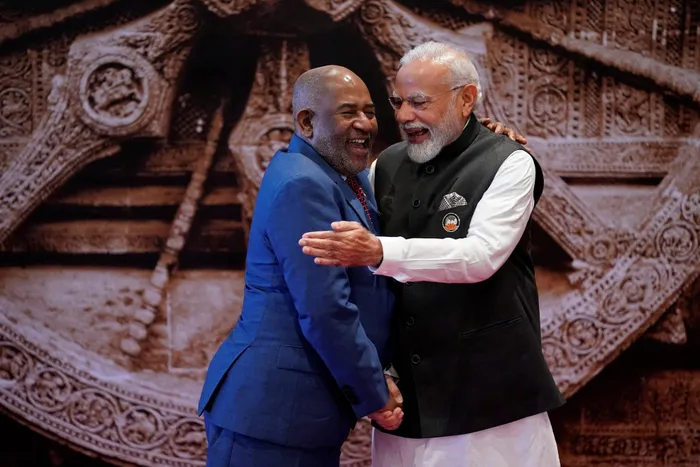AU may find the G20 valuable

Picture: Evan Vucci/Pool via REUTERS/TPX/Taken on September 9, 2023 – Indian Prime Minister Narendra Modi, right, shares a light moment with President Azali Assoumani of the Union of the Comoros, who is also chairperson of the African Union, upon his arrival at Bharat Mandapam Convention Centre for the G20 Summit in New Delhi, India, Saturday, September 9, 2023.
By Sizo Nkala
The African Union (AU) became a permanent member of the Group of Twenty (G20) at its summit in New Delhi, India, last weekend. The AU had all along been attending G20 gatherings as an invited international organisation without the right to vote. Now it joins the European Union (EU) as the only other regional organisation with permanent membership in the G20.
The AU’s accession to permanent membership was the culmination of a sustained campaign by the AU leaders and India’s use of its G20 presidency to prioritise the AU’s permanent status on its agenda. Whether this was motivated by the Sino-Indian competition for Global South leadership is a matter for another day. It also helped that none of the other major countries namely the US, China and Russia objected to the idea.
Acquiring the G20 membership is in many ways a milestone in the AU’s organisational credentials. It is the materialisation of the foundational aspiration of the AU and its predecessor, the Organisation of African Unity (OAU), which sought to represent a collective African position on the international stage. Aspiration 7 of the AU’s Agenda 2063 commits to the emergence of “Africa as a strong, united, resilient and influential global player and partner”.
The founding document of the AU – the Constitutive Act – gave further impetus for the organisation’s role on the global stage as it mandated the continental body to defend and promote common African positions and actively represent the Continent in international affairs. As such, articulating a collective foreign policy was a fundamental element of the conception of the AU and its membership of the G20 – a premier global policy-making forum – would enable the body to fulfil its mandate.
The AU has long been actively involved in cultivating relations and partnerships with a variety of external actors, including the UN and regional organisations such as the EU and the League of Arab States. It has also participated in various forums namely the Forum on China-Africa Co-operation (FOCAC) where the AU Commission is a full member, the Africa-South America Co-operation Forum, and the Tokyo International Conference on African Development (TICAD) among others. Another layer of the AU’s active external partnerships includes its association with individual countries such as India, Turkey, the US, and Russia to mention a few. In each of these interactions, the AU strives to promote common African positions.
However, the G20 membership marks a turning point in the organisation’s diplomatic activities in that it is the first time it becomes a permanent member of an important international forum. While it has participated in other forums under the Africa banner, it will participate in the G20 as an independent entity with voting rights. Many have long called for Africa to adopt a multilateral approach rather than a bilateral approach on international platforms in order to amplify its voice.
The AU’s G20 membership gives the continent the opportunity to work out the modalities of a multilateral approach to its global engagements. If successful, this could see a qualitative change in the format used in other platforms such as TICAD, FOCAC, the US-, Russia-, and France-Africa Summits where every country on the Continent represents itself.
In a characterisation that could be applied to most of the Africa + 1 summits, Shirley Ze Yu aptly described the FOCAC as 53 pairs of bilateral relationships under one roof. In such settings, individual African countries end up competing for the attention of the major country instead of co-ordinating with each other. In the end, continental programmes are subordinated to national interests. Hence, the AU’s G20 membership may force Africa to reform its sub-optimal approach to external partnerships, which could yield better outcomes for the Continent.
Further, the AU’s G20 membership gives Africa a seat at the table of the one of the most influential global policy forums. The G20 collectively produces 85 percent of global GDP and controls 75 percent of international trade. The decisions it makes have a global impact, which is even felt by regions and countries not represented in the group. As the decisions made by the forum are reached by consensus, the AU has the opportunity to influence global policy on such issues as the international financial system, climate change, digital technology, international trade, and peace and security.
Through the G20, the AU leadership will interact more intimately with the leaders of major countries on continental programmes and projects such as the Programme for Infrastructure Development in Africa, the African Continental Free Trade Area (AfCFTA) and the African Peace and Security Architecture (APSA). Moreover, Africa has of late been disproportionately affected by global shocks like the Covid-19 pandemic, the Russia-Ukraine war and climate change disasters. Having a seat at the G20 will enable the AU to advocate for a more equitable response to global shocks that do not harm Africa’s interests.
Nonetheless it is important not to get ahead of ourselves and think that the G20 membership will solve all of Africa’s problems. The group is a loose association of countries, some of which are hostile to each other. The lack of co-ordination and coherence emanating from this is compounded by the fact that its decisions are not binding, which could blunt its impact. However, the fact that it has lasted for 18 years means that its participants find it valuable. The AU may find it valuable too.
Dr Sizo Nkala is a Research Fellow at the University of Johannesburg’s Centre for Africa-China Studies